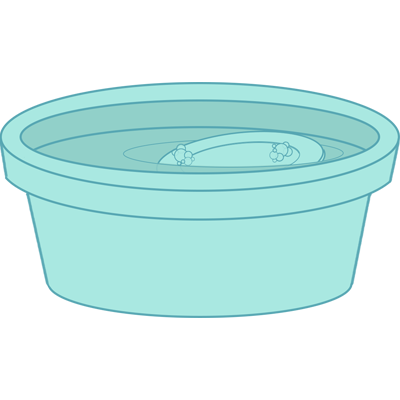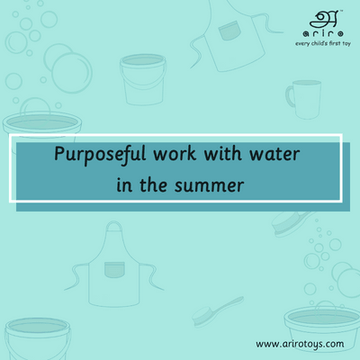Purposeful work with water in the summer
(Author Ms.Nithya Ramachandran - Montessori Guide and Consultant)
Practical life activities are activities of everyday living. The things we do take care of ourselves, others, and the environment around us all count as practical life activities. Washing, cleaning, dusting and other such activities all fall under this category.
In Montessori classrooms and homes around the world, children willingly and joyfully participate in washing clothes, watering plants, cleaning windows, sweeping and mopping floors. When babies are born, we perform these activities to them – we wash and clean them, we feed them and take care of their other practical life needs. But as children grow more capable of using their hands and their body, especially once they start walking, they can participate in these practical life activities along with us.
Washing activities
Set up a simple washing activity for your child either in the bathroom, balcony, hallway or garden. You can even set this up in the room on a thick towel

The general flow of the activity would look like this
Step 1

Bring water in the mug and pour into both basins (they may have to go to the water source twice for this)
Step 2

Dissolve soap into the water in the first basin – try to use non-toxic and child friendly soap as much as possible
Step 3

Wash the item in soap water and use a brush or scrub if necessary
Step 4

Rinse the item in the second basin which has clean water
Step 5

Wash other items if available, in the same manner.
Step 6

Pour out the water from both the basins into the bucket
Step 7

Carry the bucket to the drain and empty it or pour it into plants if the soap is non-toxic
You can use this set up to do a variety of washing activities with your child. A few options are
- Washing clothes – they can start with little dish cloths, hand towels and then even move on to their own clothes
- Washing vegetables- start with harder ones like potatoes, pumpkins and carrots if your child is new to this
- Washing vessels – start with cups, spoons and plates that aren’t too greasy
- Washing toys – toys that are made of washable materials can be used for this
Benefits of Practical Life Activities
- Practical life activities aid in fine and gross motor development. Squeezing out wet cloth requires builds strength of the upper body while practicing how to button something improves fine motor movement.
- When children begin to do these activities for themselves as well as for others, they begin to become independent, and this further builds their self-esteem and confidence.
- When children take care of themselves and the environment, they begin to feel like contributing members of the family and community.
- Participating in practical life activities builds a child’s sense of responsibility.
- The various nouns and verbs that we use around practical life support language development.
- Working with water, soap, sponges, and sprays provides rich experiences for their sensorial development.
- Practical life activities call for repetition of movement – they may have to sweep a place many times before it gets clean. This kind of repetition builds concentration and focus.
- Children gain real life skills that serve as a foundation into becoming self-sufficient adults later in life.
- All practical life activities require children to think about the sequence and solve problems. This builds logical thinking and mathematical skills.
- These activities help build a child’s spatial awareness – how do I move within this space to complete this activity?.






